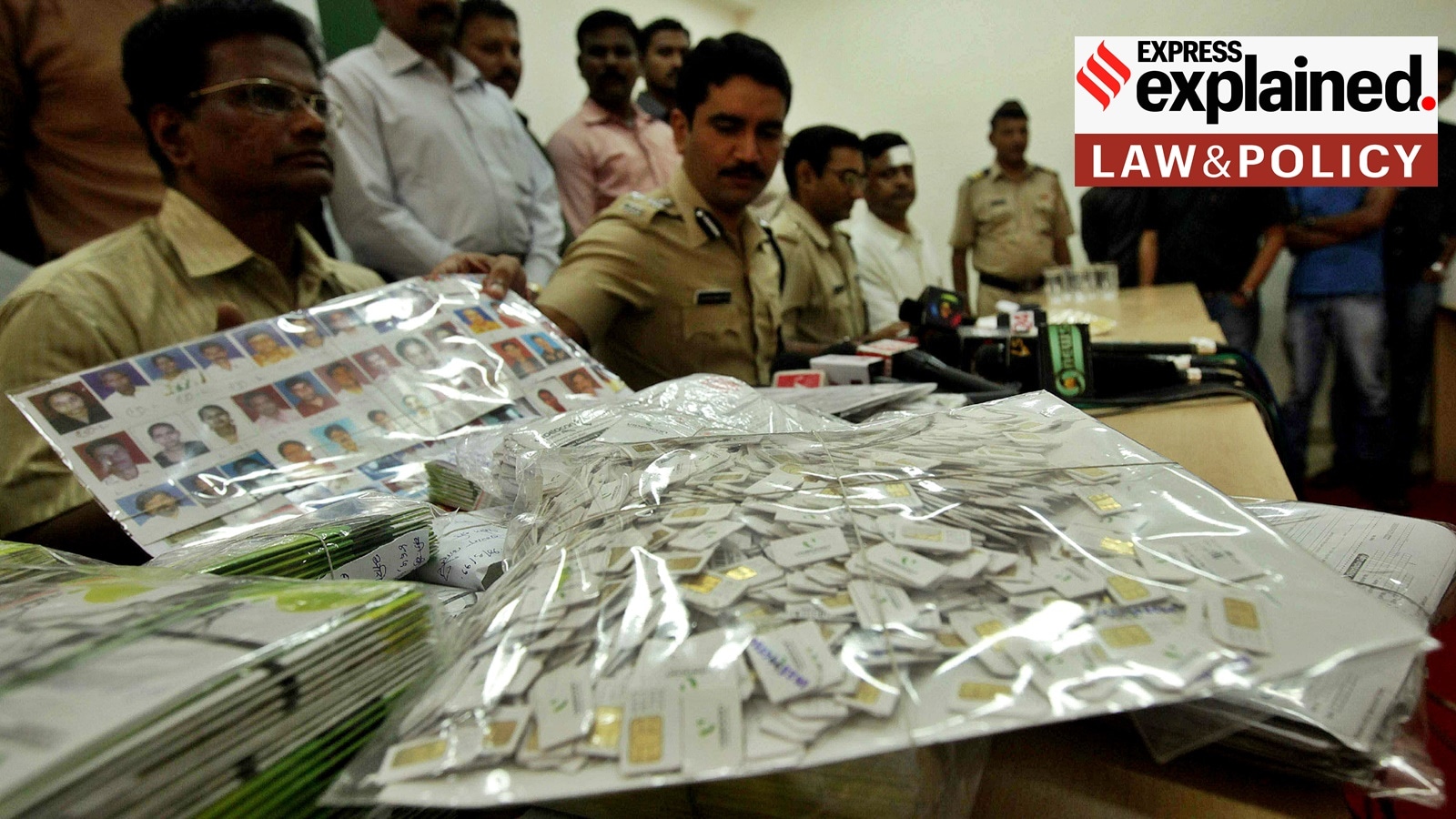Why Punjab & Haryana HC recommended a limit of one SIM card per person, what the law says
The high court questioned why multiple SIM cards can be registered under one name, in light of rising cases of online fraud. What does the law say and what are the issues in linking SIM cards to security?
 Mumbai police with its recovery from a fake SIM card racket. (Express archives)
Mumbai police with its recovery from a fake SIM card racket. (Express archives)The Punjab and Haryana High Court urged the Centre to intensify efforts in monitoring and regulating the issuance of multiple prepaid SIM cards to individuals, amid rising cases of online fraud.
The order was part of a case where the court rejected a man’s bail plea in Haryana last month. He allegedly obtained 35 SIM cards to help carry out an online scam and was later arrested. A single-judge bench of Justice Anoop Chitkara said the state government should conduct “further investigation regarding such SIM cards and their usage”. It also suggested that no more than one SIM card per person should be issued.
What was the case?
In ‘Sumit Nandwani vs. State of Haryana’, the court was dealing with an interim bail application from Nandwani, currently lodged in Hisar’s Central Jail.
The case against him dates back to last year when a man reported receiving a WhatsApp message, asking if he wanted to earn money while working from home. While initial interactions with the sender included repayments that built trust and led him to make further deposits, he was eventually defrauded of over Rs 8 lakh.
Haryana police discovered multiple bank accounts and mobile numbers connected to the case. It found that Nandwani acted as a point-of-sale agent who activated the SIM numbers used in the scam and registered them under the names of different people. He then provided them to the co-accused.
Nandwani reportedly obtained the prepaid SIM cards by registering them under his Aadhar card. This prompted the court to ask why no government measures restrict individuals to a single pre-paid SIM card.
What the court ruled
In its May 27 interim order, the court spoke about a “pervasive threat of cybercrime” that has led to a heightened sense of vigilance among Indians. Noting that many such scams have been orchestrated through mobile phones, the court said, “Following the exploitation of a certain number of victims, perpetrators routinely discard or deactivate their SIM cards, acquiring new ones to perpetuate their nefarious deeds. Disturbingly, reports suggest that these actors obtain prepaid SIM cards under not only their own identities but also those of unwitting individuals, often through deceitful means.”
It also questioned the Ministry of Telecommunication about why it allowed individuals, firms, or companies to acquire multiple prepaid SIM cards under their names. “Given the Aadhar Card is exclusively linked to a single SIM card for OTP generation, there seems to be no justification for the issuance of multiple prepaid SIM cards,” the bench ruled.
Restricting pre-paid SIM cards to one per individual could significantly mitigate cybercrimes, the court said. It added: “Even the Hon’ble Supreme Court was conscious of the importance of one mobile number and the same is reflected in ‘Vernon v. The State of Maharashtra’”. In this case, the Supreme Court imposed the condition that the two appellants given bail in an Unlawful Activities (Prevention) Act case were allowed to use one mobile each.
What does the law say on how many SIM cards a person can own?
Courts and the government have earlier restricted the sale of SIM cards without identity verification. In its 2005 ruling in ‘State (NCT of Delhi) vs. Navjot Sandhu alias Afsan Guru’, the top court dealt with a matter related to the 2001 Parliament attacks. In executing their plan, terrorists made a large number of calls from phones with unverified SIM cards.
The Department of Telecommunications (DoT) under the Ministry of Communications then issued notifications in 2006 and 2009 for banning the sale of pre-activated SIM cards. Unlike pre-paid SIM cards, no ID proof or forms were required for them and they could be immediately activated after being inserted into phones.
However, a petitioner approached the court in 2012, saying around 80% of the pre-paid SIM cards could still be purchased in pre-activated form. He also sought directions to be issued by the government for framing guidelines for telecom firms issuing SIM cards.
In its three-judge bench ruling in ‘Avishek Goenka vs. Union of India’ (2012), the SC directed the constitution of a joint expert committee and asked it to submit a response to the government. Nearly four months later, the Telecom Ministry issued instructions by way of a circular, saying that an individual category customer (i.e., local, outstation, and foreign) can subscribe to “a maximum of nine mobile connections” in his or her name across all telecom service providers and Licensed Service Areas (LSAs). For people in Jammu and Kashmir, Assam, and the Northeast LSAs the limit was set at six connections.
It also said that while filling out the customer application forms, individuals must provide a declaration about the connections already held.
What are the issues in linking ID cards with mobile phones?
While linking ID cards to phones may seem like a possible security solution, it involves significant privacy and compliance issues.
Apar Gupta, advocate and co-founder of the Internet Freedom Foundation, told The Indian Express, “These instructions (on limiting the number of mobile connections) emerged from the government’s licensing power, but there exists a lack of pro-active scrutiny and audit of practices by telecom companies.”
Referring to the Supreme Court’s decision in ‘KS Puttaswamy vs Union of India’ (2018), which upheld the fundamental right to privacy, Gupta also pointed out that linking Aadhar with SIM cards is not mandatory. Aadhar is only one of the identity documents an individual can provide.
Delhi-based lawyer Radhika Roy said that despite the clear mandate laid down in the Puttaswamy case, saying there shall be no mandatory linking of Aadhar with SIM cards, the recent Telecommunications Act of 2023 mentioned it.
“Section 3(7) of the 2023 Act states that the entity issuing SIM cards must identify the person to whom the service is being provided through the use of any verifiable biometric-based identification. Since the only biometric-based identification in India is Aadhar, one can invariably assume that Aadhar is now mandatory for accessing any telecom services, including purchasing a SIM card,” Roy said.
- 01
- 02
- 03
- 04
- 05






































